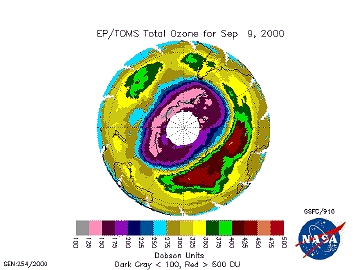
September 10, 2000 Greenbelt, Maryland - The ozone hole over the Antarctic is the biggest it's ever been and it's only the beginning of September. Usually Antarctic ozone depletion starts in July during the South Pole's winter. That's when extremely cold air intensifies ozone destruction, reaching a peak by the end of September and into October. But this year, NASA's Goddard Space Flight Center in Greenbelt, Maryland reports that already the ozone hole is larger than all of the Antarctic and extends over the southern tip of South America. That's 11 million square miles and breaks all previous records. A spokesman at the United Nations World Meteorological Observation agency in Geneva, Switzerland told reporters: "It is remarkable to find these low values so early in September, perhaps one or two weeks earlier than in any previous year."
Click here to subscribe and get instant access to read this report.
Click here to check your existing subscription status.
Existing members, login below:
© 1998 - 2025 by Linda Moulton Howe.
All Rights Reserved.

